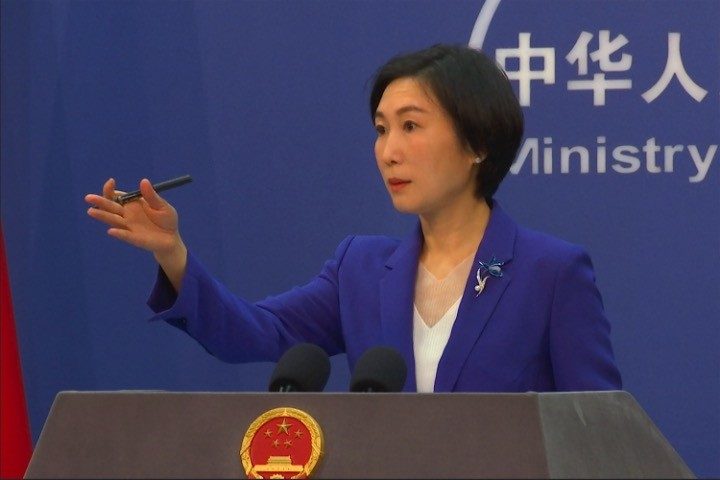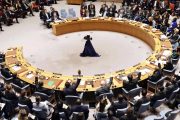
Beijing is upset over reports that China is considering providing Russia with artillery and ammunition amid the Ukraine War, calling the United States out for “disinformation” and a “double standard.”
On Monday, China’s foreign ministry said the communist regime is advancing peace talks while America exacerbates the conflict.
“On the Ukraine issue, China supports an objective and just position and actively promotes peace talks. The U.S., however, has been fanning the flames and fueling the fight with more weaponry,” contended Foreign Ministry spokesperson Mao Ning during a news briefing.
“The U.S. has been spreading disinformation about China supplying weapons to Russia and using the allegation to sanction Chinese enterprises,” Mao added, describing Washington’s actions as a “double standard and the very definition of hypocrisy.”
Mao also took aim at expanded sanctions last week against Chinese companies, including Spacety China, which has given imagery of Ukraine to the Russian private military contractor Wagner Group.
China’s government last year announced a “no limits” partnership with Moscow, and has avoided condemning Russia’s actions even while claiming to be neutral.
Recently, China released a 12-point peace proposal which critics, including those in Washington, say is too favorable to Russia. Nevertheless, Ukrainian President Volodymyr Zelensky said last week that he wanted to discuss the plan with Chinese President Xi Jinping.
U.S. officials speaking to the media have not provided evidence of their claim that China is seeking to send artillery and ammunition to Russia, but White House officials have nonetheless warned Beijing against doing so. National Security Advisor Jake Tapper said it would be against China’s interests to send Moscow lethal aid.
NBC News, which confirmed the original Wall Street Journal story on China’s alleged military aid to Russia, further reported on the rising tension between Washington and Beijing:
Also on Monday, China accused the U.S. of undermining peace and stability in the Taiwan Strait by flying a P-8A Poseidon maritime patrol and reconnaissance aircraft through the narrow waterway, which China claims as its territory along with the island of Taiwan. Taiwan and the U.S. consider the strait to be international territory, and it is regularly traversed by U.S. warships and sometimes aircraft.
“The action of the U.S. deliberately interferes with and disrupts the situation in the region and jeopardizes peace and stability in the Taiwan Strait. We firmly oppose this action,” the Eastern Theater Command of China’s People’s Liberation Army said in a statement.
A statement from the U.S. 7th Fleet, which has operational command of all U.S. naval forces in the region, said the flight demonstrated Washington’s “commitment to a free and open Indo-Pacific.”
Notably, a Chinese fighter jet on Friday flew within 500 feet of the American aircraft. According to one U.S. Navy officer, these types of encounters are becoming more frequent, although they have thus far remained professional in nature.
In another development, Belarusian President Alexander Lukashenko, who allies himself closely with Russia, went to China on Tuesday.
Lukashenko has supported Russia during the war, allowing Moscow to use Belarus’ territory as a staging ground for the invasion last year. Russia is also using Belarus to keep a contingent of weapons and soldiers, and the two countries are performing military drills together.
Speaking to the Chinese press, Lukashenko said that this is “a unique situation … to put a stop to the conflict.”
Belarus’ president also said his country “entirely agrees with and supports China’s position and proposition on a political solution to the Ukrainian crisis, which is significant to resolving the crisis.”
Recently, Russia, China, and South Africa performed naval drills together off South Africa’s coast.
South African Chief of Joint Operations Lieutenant General Siphiwe Lucky Sangweni told the press that these exercises were conceived two years ago, countering accusations that they were scheduled amid the war in Ukraine.
Nevertheless, the exercises were notable in that they showed the closeness of the Russian and Chinese militaries and the support they have within the international community. This extends to the Middle East, including Iran — which is finding a favorable relationship with Russia and China after having been stigmatized by the United States and the Western powers for so long.
Both Russia and China are cementing their relationships with Iran. As The New American has previously reported, Moscow has now become the number-one foreign investor in Iran, according to the latter’s deputy finance minister, Ali Fekri, and Beijing and Tehran are finalizing several bilateral cooperation agreements aimed at integrating the two nations’ economies to a historically unprecedented degree.
Yet even as U.S. government officials recognize the ever-growing threat of China, their ability to take strong action on the matter is hamstrung by decades of American foreign policy whose result has been to make the nation economically dependent on China.
And because China now has such influence among the political class, efforts to reduce this dependence often get killed or watered down, as is the case with an executive order on U.S. investment in China being prepared by the Biden White House.




